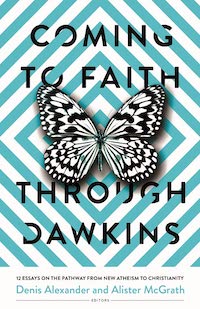
One of the highest impact activities I’ve been involved in during my nearly 20 years in science and religion was responding to Dawkins’ documentary The Root of All Evil in January 2006. I was working at the time for Christians in Science (CiS). One of our members heard about the series in advance and suggested we respond by putting some resources on our website. We collected a handful of articles, including a series from Mike Poole, a lecturer in Science Education who had debated Dawkins in our journal Science and Christian Belief some years previously. As I put these pieces online I included a long line of meta tags in the html code, hoping to attract a decent amount of traffic.
I later discovered that over February-December 2006 the CiS website received 1,350,000 hits, but in January alone there were 5.4 million. Even allowing for the fact that web stats weren’t massively sophisticated back then and didn’t screen out non-human hits, it seems to me that our resources went viral, signalling a massive demand for responses to Dawkins’ claims. Since that time, other UK-based organisations have emerged that address this topic with the general public, not least the Faraday Institute for Science and Religion. But for a long time, CiS was a pioneer in promoting a healthy discussion about science and Christian faith.
The Root of All Evil was essentially a summary of The God Delusion, which came out later in 2006. You don’t have to go far to find a critique of this book, but in the years since then something else has been going on. Denis Alexander and Alister McGrath found that people were coming to them with stories of having been set on a path to faith by Dawkins’ writing. These individuals had read the God Delusion, found its arguments wanting in various ways, and realised that they hadn’t examined Christianity in a truly rational way. When they started engaging with the work of thoughtful writers and speakers, they were surprised to change their minds and embrace the religion they had rejected for so long.
Alexander and McGrath decided to collect these stories together as a book, cheekily titled Coming to Faith Through Dawkins. The first chapter is a fairly in-depth summary of the discussion, including a good dose of science. One or two others are also fairly hefty – which may be a plus or minus point depending on your perspective. The rest of the chapters are conversational accounts of each person’s journey – all different, but all describing deep thinking as well as personal experiences that set them on the unexpected path to faith in Jesus. The contributors include a number of academics and represent a range of Church traditions.
Of course I don’t agree with every word these twelve people write, but I would happily put this book in the hand of a friend who wanted to explore a Christian response to Dawkins’ thinking . We probably all know people who have appreciated – or been impressed by the fame of – his largely scientific writing, but have mixed feelings about his response to religion. In chapter four Anikó Albert captures what many feel. ‘I felt, even while I agreed with most of what I was reading, that scientist Dawkins was joyful and creative and atheist Dawkins was angry and rigid, and I liked scientist Dawkins better.’
For some people, it can take time to process the idea that one can be a Christian and embrace rationality. For most of the contributors to this book, relationships with thinking Christians – including scientists – were key in their journey to faith. Johan Erasmus (chapter 6), was shocked into intellectual activity by meeting a theology student who told him to ‘get some better atheists.’ She exposed him to the ideas of Nietzsche, Thomas Nagel and Michael Ruse, then started arguing against them. Johan, like several of his co-authors, was then challenged and helped along the way by the philosophy of William Lane Craig – someone Dawkins has refused to debate.
This book is not intended as a personal attack on Dawkins. I have known from time to time what it’s like to feel ‘angry and rigid’ in debate (thankfully – I think – only in informal conversation with friends). I also know what it feels like to be invited to debate a famous philosopher who would no doubt wipe the floor with me. But given the size of Dawkins’ platform over the years, I feel that it’s only fair to give his views a good airing, offering a robust critique and some alternative views.
So here’s to people who ask awkward questions and have the courage to change their minds, to atheists who are willing to share their views, to the organisations that host these conversations, and to the initiative of the two people who collected these stories so that many others can read them.
 Coming to Faith Through Dawkins: 12 Essays on the Pathway from New Atheism to Christianity (Kregel, August 2023) by Denis Alexander and Alister McGrath (Eds) is available in the UK in paperback and Kindle editions.
Coming to Faith Through Dawkins: 12 Essays on the Pathway from New Atheism to Christianity (Kregel, August 2023) by Denis Alexander and Alister McGrath (Eds) is available in the UK in paperback and Kindle editions.




